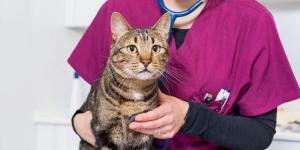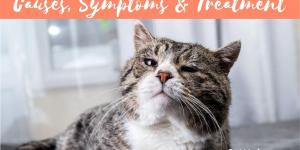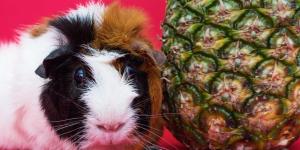My Lovebird has Diarrhea - Causes and Treatment

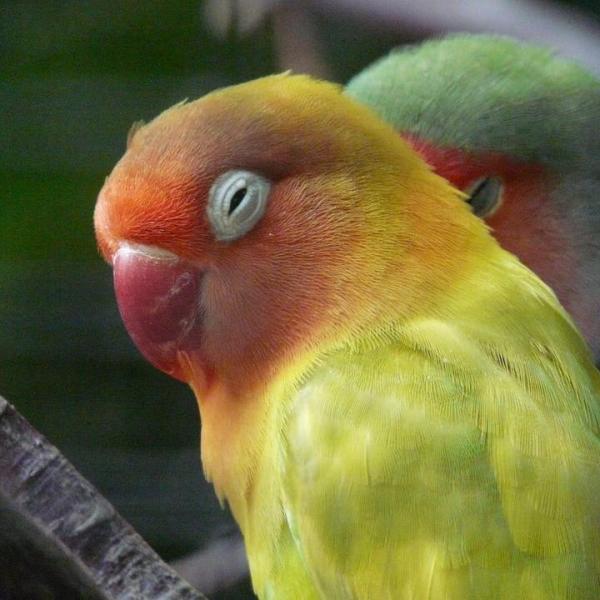
Lovebirds are becoming more and more popular as household pets. Their rich color, beauty and "inseperable" nature make them as well loved as the canary once was.
But the arrival of any bird, exotic or not, puts us in front of new situations that we are sometimes not accustomed to face. Does your lovebird have diarrhea? AnimalWised is here to distinguish pathological cases from parasitic or viral and show you how to handle the situation. In the following article we will establish the possible causes and how to treat this condition.
Sometimes it is not diarrhea
We may notice on the floor of our lovebird's cage that their feces contain more liquid than usual, and immediately identify this as diarrhea. However, this is not always the case.
Cloacal evacuations in birds are composed of a greenish part (they can vary in color if they take fodder, they are the real feces), a white part (urates, mineral salts), and a liquid part (the urine). Everything comes out through the cloaca, the place where the urinary, digestive and reproductive apparatus converge.
There are many common causes that can liquify the excrement, giving them an appearance similar to that of diarrheal stools. This can sometimes be as simple as increased dietary water intake. So, before saying that our lovebird has diarrhea, we must reflect on possible changes in their life:
- Stress: can be caused by a change of location within the home or, for example, separation of a friend (death or homecoming of a new individual). The most acute stress may be detected during the visit to the vet. They will ask us not to remove newspapers from the cage, or the base we have set to compare the feces prior to the consultation. Because, there is always abnormal liquid, without there being any digestive pathology.
- More liquid intake in the diet: for example, more fruit or more leafy-based food (especially lettuce).
If our lovebird has general symptoms of disease (apathy, anorexia ...) in addition to apparently diarrheic feces, or we locate remains of feces around the cloaca, staining the feathers, they surely have diarrhea. Then it will be time to look for the causes. Even though it is mild, diarrhea can readily dehydrate such a small animal, and our lovebird will need to be supportive treatment (maintaining fluid and heat supply) until the process is controlled.
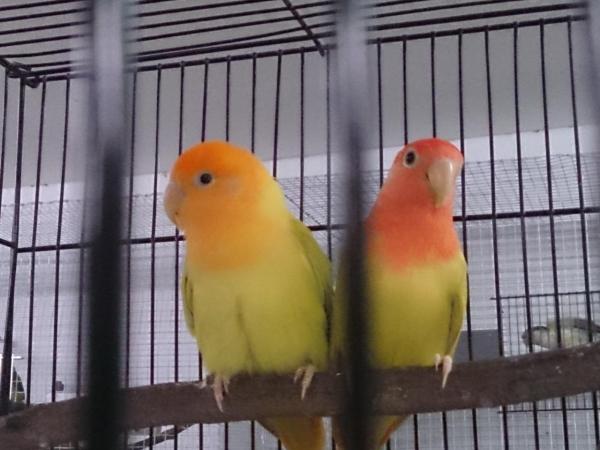
Diarrhea of parasitic origin
There are many parasites that can affect our lovebird, but basically, three that can produce diarrhea:
- Giardia: They are single-celled parasites flagellated (move by a flagellum), typical in communities, and can cause diarrhea without majorly affecting the general state of our lovebird. Our vet will diagnose it by direct observation under a microscope of fresh feces, and will give us albendazole or fenbendazole (although some opt for an antibiotic with action against giardias, metronidazole) for several days. It is necessary to watch the rest of the lovebirds if they coexist with more, since it is quite contagious, and will require a thorough cleaning of the cage and to dry all the surfaces carefully. The giardias thrive in humid zones.
- Coccidiosis: other unicellular parasites, and very contagious, although more typical of other birds like canaries or goldfinches. It causes almost always hemorrhagic diarrhea, accompanied by general signs of illness (anorexia, depression, bruised and poorly shaped plumage, weight loss ...). Coccidiosis is spread by feces from diseased animals. Again, separating birds if there are more than one, and thorough disinfection, are essential. The diagnosis is also made by direct observation with the microscope, and our veterinarian can prescribe different drugs: sulfadimetoxin, sulfaquinoxalina, metronidazol... Although it does not work, it may be necessary to use diclaruzil or toltrazuril. The treatment will last several days and you can apply it in their water, although the safest way is to give the treatment directly into their beak. Support therapy is obviously necessary again in these cases.
- Nematodes (worms): the so-called "metazoans" are not very common in companion birds, but depending on their origin, they can affect our lovebird. If the infestation is very severe, they can cause diarrhea, often accompanied by nonspecific signs such as weight loss, poor glossy plumage, blood in the stool. They respond well to the treatment with albendazol or febendazol during several days. This treatment has the advantage of acting over many days so it slowly eliminates all the parasitary forms without "blocking" the intestinal transit. The vet diagnoses the problem by observing the feces on the microscope and seeing the eggs. The vet will probably ask for feces from several days (because the parasites don´t leave everytime the animal defecates.)
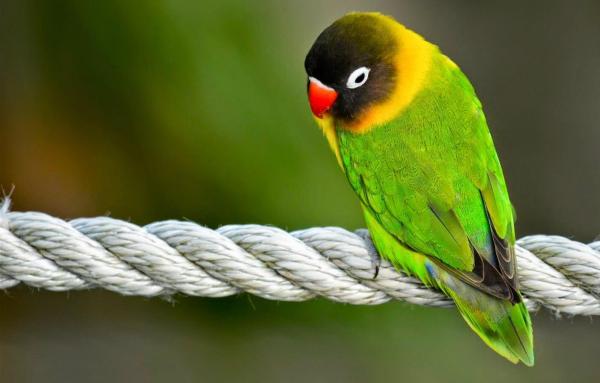
Diarrhea of viral origin
Sometimes our lovebird has can have an underlying condition, but the first thing we see or call attention to this disease is precisely the onset of diarrhea. There are multiple viral infections that can affect our bird, many of them with an acute course and that lead to death in a short time.
Regardless of the virus that causes diarrhea, we must know that when these are responsible for it, the life of our lovebird is compromised by injuries that go beyond the enteric.
Those involved are usually reoviruses, adenoviruses and polyomaviruses. All of them usually cause hemorrhagic diarrhea due to acute enteritis, involved in a process that can lead to fatal death, and which causes dejection and anorexia. The diagnosis is made through specific laboratory tests (PCR in feces, for example), and sometimes they lose many lives to reach it.
Treatment of all viruses is symptomatic, which means that we are limited to providing fluid and nutrients, maintaining heat, and antibiotics to prevent secondary bacterial outbreaks (antibiotics do not kill viruses but stop bacteria that want to join).
The cleaning, disinfection and isolation of sick birds are fundamental to control these outbreaks. Like almost all causes of diarrhea, it is much more frequent to observe them in communities of birds, for obvious reasons.
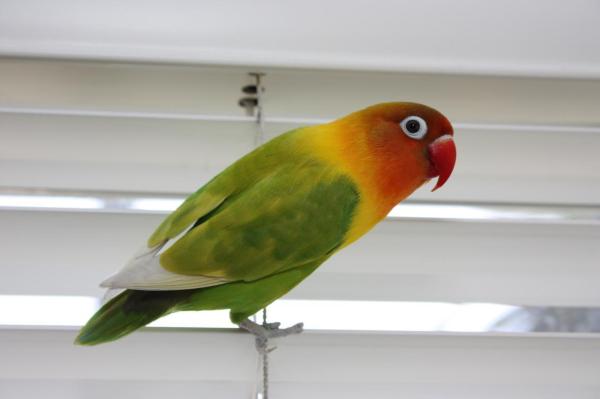
Diarrhea of bacterial origin
Bacteria can also be responsible for diarrhea in our pet lovebird. Among them, the most frequently involved will be:
- Chlamydia Psittaci
- Escherichia coli
- Clostridium
- Slamonella
Chlamydiosis is perhaps the most remarkable because of its status as a zoonosis (it can affect immunosuppressed people) and because in addition to a depression of anorexia and diarrhea in the bird, it can cause less general signs. Signs that are located in the respiratory system: conjunctivitis, sinusitis, pneumonia...
Diagnosis can be made by taking cloacal samples with a swab, and by looking for the causative agent ( Clhamydia psittaci ) by techniques such as ELISA or PCR. However, it takes too long, so sometimes one chooses to look for antibodies against this bacterium. There are quick kits available, but the fact that there is antibodies only proves they have been in contact with this bacteria at some point and may have repelled it, so you need to be open to other options.
The treatment is based on antibiotics, doxicillin being chosen. An adequate diet, supportive therapy, and hygienic sanitary measures are again major.
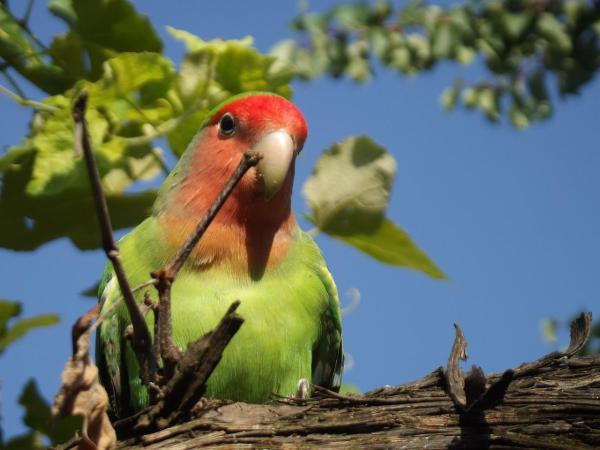
Diarrhea of fungal origin
Yeasts are the fungi most involved in diarrhea in birds. Of these, two are especially important:
- Avian gastric yeast: a large yeast, which like virtually all, is naturally in the digestive tract of our lovebirds and other birds. In situations of stress, immunosuppression, general illness, prolonged treatment with antibiotics... etc, it can grow disproportionately and cause diarrhea. It is identified by the staining of the samples obtained, and their treatment is based on antifungals (itraconazole, fluconazole or nystatin ). But we must correct the underlying cause that is causing the wild proliferation of this yeast.
- Candida: again present naturally in the digestive tract and oral mucosa. Its treatment is very similar to that of avian gastric yeast.
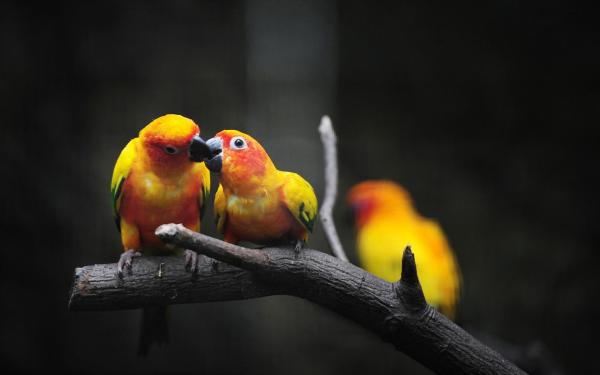
Other causes of diarrhea in lovebirds
Less commonly, diarrhea can be caused by other factors:
- Cloacal papillomas: they are wart-like structures in the cloaca. They can lead to malformed feces, an episode of diarrhea, and then, the opposite - constipation.
- Distocias: egg retention in the cloaca, with no possibility of leaving (too large, for example). It causes the same effect as a cloacolite.
- Foreign bodies in the intestine: if our lovebird has swallowed a toy, or some other foreign body, we may notice slight diarrhea. This will occur before the total absence of feces by obstruction of the intestinal lumen.
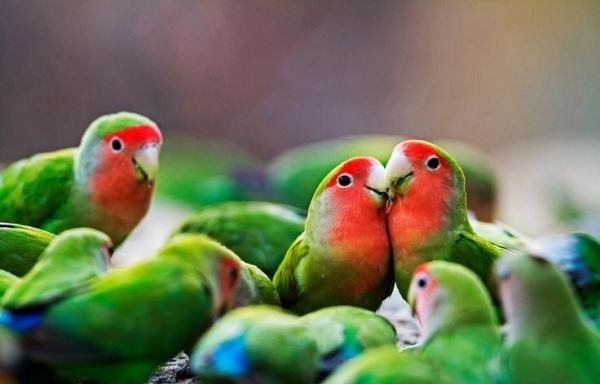
This article is purely informative. AnimalWised does not have the authority to prescribe any veterinary treatment or create a diagnosis. We invite you to take your pet to the veterinarian if they are suffering from any condition or pain.
If you want to read similar articles to My Lovebird has Diarrhea - Causes and Treatment, we recommend you visit our Other health problems category.

